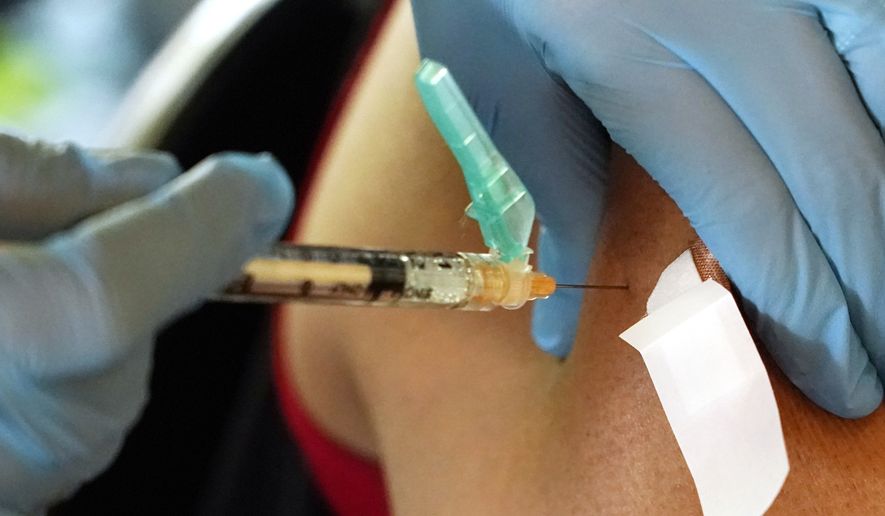The Biden administration has secured 66 million doses of a reformulated COVID-19 shot from Moderna ahead of a fall booster campaign that will further place America on a path toward managing the virus like the seasonal flu.
The purchase adds to the 105 million doses the U.S. government secured from Pfizer of its “bivalent” booster that targets both the original strain of the virus and the BA.5 variant that is ripping through the country.
The variant has been able to evade certain immune defenses in people who were infected previously or received the vaccine. Government officials this year opted to reformulate the shots in the hope of producing a better antibody response.
“We must stay vigilant in our fight against COVID-19 and continue to expand Americans’ access to the best vaccines and treatments,” Health and Human Services Secretary Xavier Becerra said Friday. “As we look to the fall and winter, we’re doing just that—ensuring Americans have the tools they need to stay safe and help keep our nation moving forward.”
The decision to procure tens of millions of doses ahead of a big booster campaign, which should begin by September or October, effectively rules out offering a second booster of the existing versions to persons younger than 50.
There had been an active debate in the White House around giving younger Americans the option to get boosted again, given fears of new variants and the fact it advised persons over 50 to get a fourth shot. But officials worry that allowing younger persons to get the existing shots now would upend efforts to give another round of shots only several weeks later.
The Food and Drug Administration and Centers for Disease Control and Prevention will have to review data from the companies and sign off on the reformulated boosters before the rollout begins.
The administration has suggested that people who got vaccinated or a booster earlier this year would be still eligible for another shot this fall.
White House press secretary Karine Jean-Pierre declined to get ahead of the agencies and comment on the exact launch date or whether older persons would be prioritized first.
“That’s going to be something that FDA and CDC does,” Ms. Jean-Pierre said. “Once we have more [about] what the plan looks like and the allocations we certainly will share that.”
Biden officials say they continue to take COVID-19 seriously, but they are trying to treat the virus as a manageable problem akin to other diseases, pointing to Mr. Biden’s mild case after getting twice boosted and using Paxlovid, a leading antiviral treatment.
Health experts say the booster campaign could become a yearly feature designed to stave off the type of cold-weather COVID-19 surge the country saw in the first two years of the pandemic.
Experts say it is not clear if the vaccines will need to be updated every year, or if BA.5 will even remain the dominant strain by September. However, the trend line is moving toward a situation where scientists and drugmakers try to match shots to what’s prevalent and avoid big surges.
“This is analogous to updating our annual influenza vaccine — to keep up with the changing flu virus and keep up with omicron virus,” said Dr. William Schaffner, an infectious diseases specialist at Vanderbilt University.
The existing shots that target the ancestral strain discovered in Wuhan, China, are generally still effective at combatting severe disease, hospitalization and death, but scientists are trying to maintain and improve their overall defenses against new variants.
“The new ones will work better, so it’s a matter of degree,” Dr. Schaffner said.
Many Americans have moved beyond the virus and see it as a threat akin to the seasonal flu. Offering a yearly shot would make it a companion to the flu shot that officials strongly recommend each year.
Only around half of the U.S. has gotten a flu shot in recent years, however, and the COVID-19 campaign could suffer from low uptake.
Among fully vaccinated Americans, only about have opted to receive at least one booster shot.
Also, the CDC says only 30% of Americans who are 50 or older and eligible for a second booster have gotten one.
Americans have resisted getting the vaccines because they do not protect against infection outright. The Biden administration says scientists are working on a new generation of vaccines or sprays that could thwart infection in the nasal cavity or offer a wide range of protection against many coronaviruses.
“I think ultimately if people desire more than just protection against severe disease, universal coronavirus vaccines or nasal coronavirus vaccines are what will need to be developed,” said Dr. Amesh Adalja, a senior scholar at the Johns Hopkins Center for Health Security.
For more information, visit The Washington Times COVID-19 resource page.
• Tom Howell Jr. can be reached at thowell@washingtontimes.com.




Please read our comment policy before commenting.